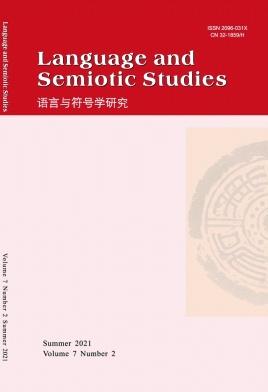Subjective transformation in poeticized language and the formation of poeticness
引用次数: 0
Abstract
As one locus of extraordinary collocations, poeticized language features expressions that depart from the physical reality, involving the subjective transformation of objects in the mental space. Increasing subjectivity renders extraordinary collocations resistant to rational readings, resulting in two types of constructions: “innovative” collocations and “self-created” collocations. The meaning construction in the former is easier to achieve than in the latter; the former entails the “rational evaluation” and the latter the “speculative evaluation” processes in metalanguage. With its rule-breaking defiance caused by meaning obscurity compensated for by rich implied meaning and positive aesthetic feedback, the “self-created” collocations are regarded as poetic and re-accepted by the system. Therefore, the so-termed “poeticness” is derived from the positive feedback during the speculative evaluation process and constitutes the main substance of aesthetic interpretation.诗化语言中的主观转化与诗意的形成
作为超常搭配的一个场所,诗化语言的特点是偏离物理现实的表达,涉及精神空间中对象的主观转换。主观性的增强使得超常搭配无法进行理性解读,从而产生了两种类型的结构:"创新 "搭配和 "自创 "搭配。前者的意义建构比后者更容易实现;前者需要金属语言的 "理性评价 "过程,后者需要 "推测性评价 "过程。"自创 "的搭配因其意义晦涩所造成的违反规则的现象被丰富的隐含意义和积极的审美反馈所弥补,从而被视为诗意的,并被系统重新接受。因此,所谓的 "诗意 "来自于推测性评价过程中的正反馈,是审美阐释的主要内容。
本文章由计算机程序翻译,如有差异,请以英文原文为准。
求助全文
约1分钟内获得全文
求助全文

 求助内容:
求助内容: 应助结果提醒方式:
应助结果提醒方式:


